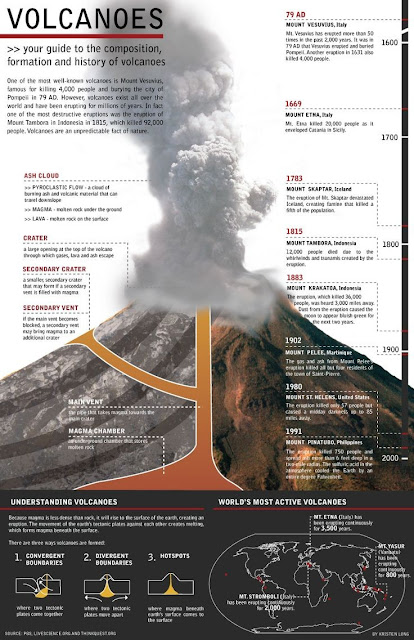What is volcano ?
Are There Volcanoes Elsewhere In Our Solar System?
By Mr DIGVIJAY SINGH
A volcano is an opening in the earth’s crust through which lava, volcanic ash, and gases escape. Volcanic eruptions are partly driven by pressure from dissolved gas, much as escaping gases force the cork out of a bottle of champagne. Beneath a volcano, liquid magma containing dissolved gases rises through cracks in the Earth’s crust. As the magma rises, pressure decreases, allowing the gases to form bubbles. How the magma (lava) behaves when it reaches the surface depends on both its gas content and
chemical composition. Lavas with low silica contents have low viscosities and flow freely, allowing any gas bubbles to escape readily, while lavas with high silica contents are more viscous (resistant to flow), so that any trapped gases cannot escape gradually.
What Causes Volcanoes?
Volcanoes occur when material significantly warmer than its surroundings is erupted onto the surface of a planet or moon from its interior. On Earth, the erupted material can be liquid rock ("lava" when it's on the surface, "magma" when it's underground), ash, cinders, and/or gas. There are three reasons why magma might rise and cause eruptions onto Earth’s surface
 |
| Volcano diagram |
Magma can rise when pieces of Earth's crust called tectonic plates slowly move away from each other. The magma rises up to fill in the space. When this happens underwater volcanoes can form.
Magma also rises when these tectonic plates move toward each other. When this happens, part of Earth's crust can be forced deep into its interior. The high heat and pressure cause the crust to melt and rise as magma. A final way that magma rises is over hot spots. Hot spots are exactly what they sound like--hot areas inside of Earth. These areas heat up magma. The magma becomes less dense. When it is less dense it rises. Each of the reasons for rising magma are a bit different, but each can form volcanoes.
 |
| Volcano in space |
Are There Volcanoes Elsewhere In Our Solar System?
Yes! There have been a lot of volcanoes on other planets in the past. Some places in our solar system have active volcanoes erupting right now! Venus and Mars are covered with extinct volcanoes. Some of the moons of Jupiter, Saturn, and Neptune actually have eruptions happening right now. We have taken pictures of these with many different NASA spacecraft!






0 Comments